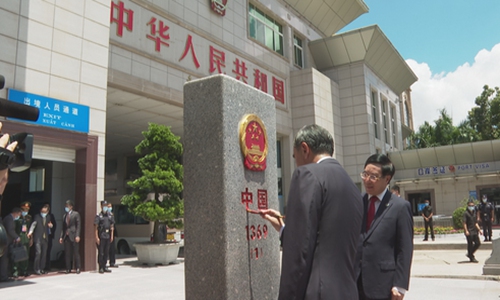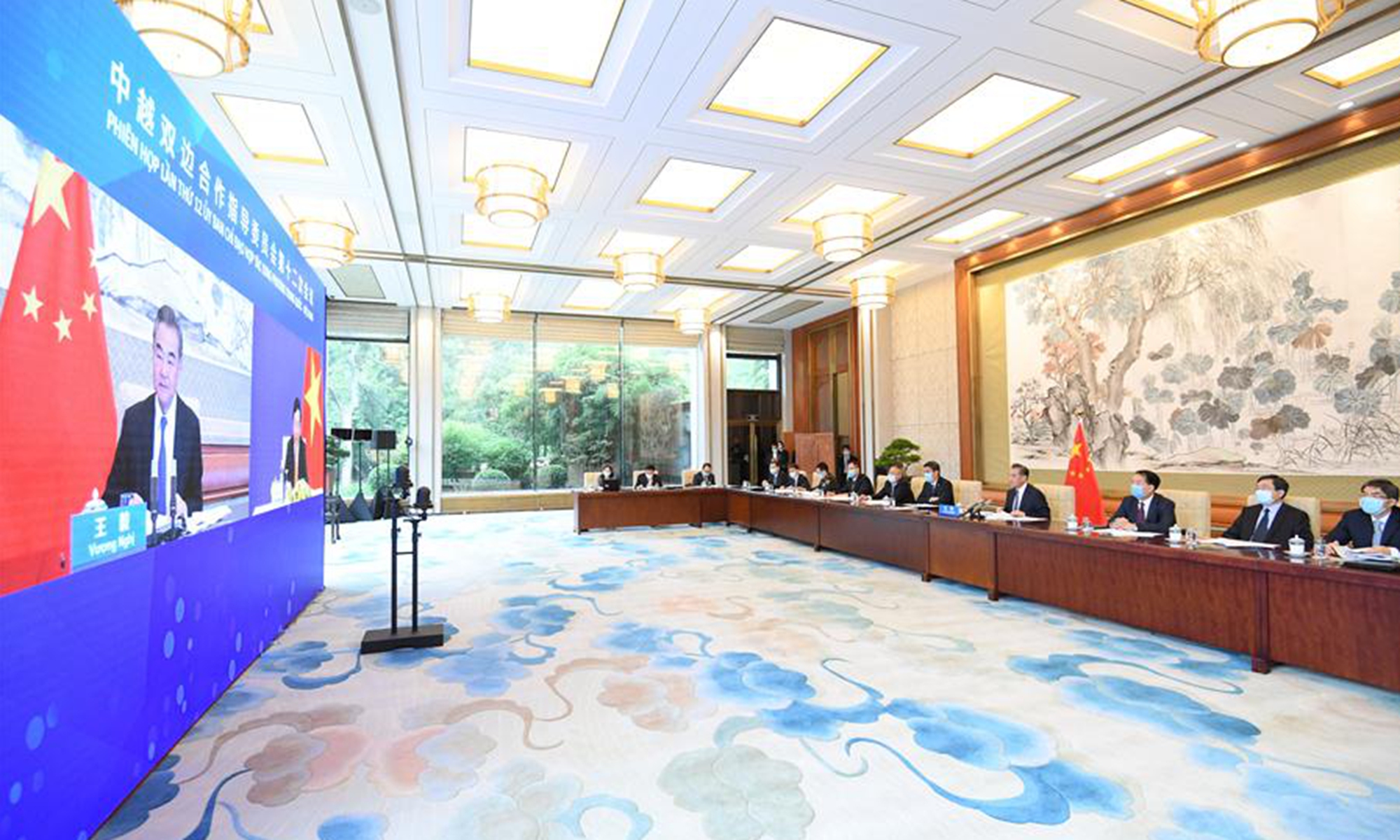Land border pact shows China, Vietnam can 'solve maritime issues without external intervention'
By Yang Sheng and Chen Qingqing Source: Global Times Published: 2020/8/23 22:16:52

Photo: fmprc.gov.cn
China and Vietnam celebrated the 20th anniversary of delimitation their territorial boundaries, a historic border land treaty between the two countries which sends a clear message that neighboring countries can solve disputes without being influenced by external forces, as the US has recently increased the provocation in the South China Sea, Chinese experts said.
Chinese State Councilor and Foreign Minister Wang Yi and Vietnamese Deputy Prime Minister and Foreign Minister Pham Binh Minh attended an event in Dongxing, South China's Guangxi Zhuang Autonomous Region that commemorated the 20th anniversary of the demarcation of the China-Vietnam land boundary and 10th anniversary of setting up pillars to demarcate the border on Sunday.
The two foreign ministers inspected the boundary pillars and traced in red ink over characters printed on each county's first boundary stone, and agreed to promote the comprehensive strategic cooperative partnership between China and Vietnam to a new level.
We must learn from the successful practice of dealing with land borders to resolve maritime issues at an early date, Wang said at the ceremony on Sunday.
China and Vietnam have accumulated valuable experience in delimiting the land boundary and completing the demarcation of the Beibu Gulf, he said, noting that the two countries are fully capable and have the wisdom to continue negotiations and consultations to further resolve maritime issues, the Chinese Foreign Minister said.
The two sides must focus on the overall situation of bilateral relations and the needs of long-term cooperation, actively carry out dialogue and consultation, find a basic and long-term solution acceptable to both sides, and jointly maintain peace and stability in the South China Sea, Wang noted.

Chinese State Councilor and Foreign Minister Wang Yi co-chair the 12th meeting of the China-Vietnam Steering Committee for Bilateral Cooperation with Vietnamese Deputy Prime Minister and Foreign Minister Pham Binh Minh via video link in Beijing, capital of China, July 21, 2020. (Xinhua/Shen Hong)
The ceremony was the second meeting between Wang and Pham inside a month after the 12th Meeting of the China-Vietnam Steering Committee for Bilateral Cooperation which was held on July 21 via videoconference. The conference is widely believed to have sent a clear signal to Vietnam that it should avoid miscalculations with China on the South China Sea issue.
The anniversary celebration between China and Vietnam comes amid rising tension in the South China Sea, especially after the US made a rare move of sending two aircraft carriers to the region recently.
The controversial maneuver made waves and forced Southeast Asian countries to make a choice between China and the US, according to some experts. However, the past history of resolving border matters shows that countries in the region can solve their own disputes by not being interfered with by external forces, Chinese experts noted.
Li Haidong, a professor at the Institute of International Relations of the China Foreign Affairs University, told the Global Times on Sunday that "the experience and wisdom that China and Vietnam have to solve the dispute on land can also inspire and guide not only the two sides but also other countries in the region to solve their disputes in the South China Sea."
Xu Liping, director of the Center for Southeast Asian Studies of the Chinese Academy of Social Sciences, told the Global Times on Sunday that the celebration delivers a clear signal to the world that China and Vietnam are able to solve border disputes through the bilateral model and that the sovereignty dispute in the South China Sea will not affect overall relations and cooperation between the two countries.
"When China and Vietnam negotiated to solve the territorial dispute on land, there was no interference from any other country and the two sides solved the problem based on their own interests after the border military conflicts in the late 1970s and the 1980s, so this is proof that without external and non-regional intervention, China can solve disputes with its neighbors successfully," Li said.
China and Vietnam signed the landmark Land Boundary Treaty in December 1999 and the two sides exchanged instruments of ratification on the treaty which took effect on July 6 in 2000, the Xinhua News Agency reported. With the signing of the treaty, all outstanding issues relating to the land border were resolved, the Chinese Foreign Ministry said.
"The solution of the land dispute between China and Vietnam 20 years ago has proved that China and its neighbors can solve the problem without any external intervention. The external forces outside the region, especially the US and its allies, that are trying to interfere in the regional issue will only make the situation get more complicated and too difficult to solve," Xu noted.
Chinese experts have warned Vietnam not to fall into a US trap as Washington only wants to use the disputes between China and Vietnam to incite conflicts and create chaos and instability. It wants to use regional countries to contain China without any cost to itself.
"Anyone who can understand the basic facts of international relations can discern that the US is just using those countries to serve its Indo-Pacific strategy to contain China, and it wants to see conflict more than cooperation in the region," Li said.
During the 12th Meeting of the China-Vietnam Steering Committee for Bilateral Cooperation in July, Chinese Foreign Minister Wang Yi, for the first time since 2006, harshly criticized extremist forces in the US that have provoked ideological disputes and coerced countries to pick sides in an attempt to bring back the notorious McCarthy era.
Wang said that as both China and Vietnam are socialist countries led by communist parties, upholding the socialist system conforms with the common interests of the two countries.
The situation of the South China Sea has been improving in the past years. China and other littoral countries have maintained dialogue and communication through consultation mechanisms on maritime affairs. The COC consultations are proceeding smoothly and speedily, with the second reading of the text already under way, and China and ASEAN members have agreed to conclude the COC at an early date, Chinese State Councilor and Foreign Minister Wang Yi said on the sidelines of the 13th National People's Congress on May 25.
But the US government has not given up stirring up the tension by carefully deploying and orienting its steps in the region. In mid-July US Secretary of State Mike Pompeo said that most of China's maritime claims in the South China Sea are "completely unlawful," and he accused China of "bullying" Southeast Asian countries. Analysts warned that the US will stir up more troubles, incite more confrontations in the region and engage in more radical and dangerous moves in stirring up military conflicts with China.
Newspaper headline: China, Vietnam 'can solve disputes bilaterally' without external intervention
RELATED ARTICLES:
Posted in: DIPLOMACY